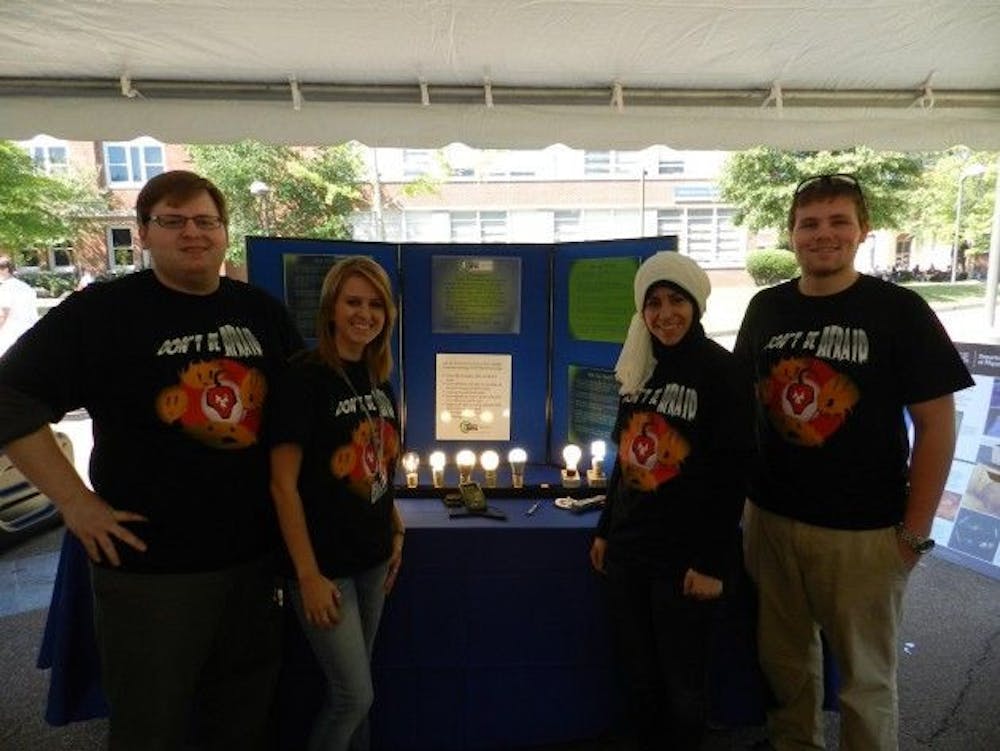Winston Smallwood works in his office in the Administration Building with the lights off and his windows open on a breezy fall afternoon because he says it's the right thing to do.
Smallwood, sophomore communications major, is the team manager for PowerSave Campus, a team of four interns who are working to make the University of Memphis a more energy-efficient environment.
Smallwood worked for building services delivering custodian supplies on campus for about four years before he became a full-time student, getting to know the campus inside and out.
"I know it backwards and forwards; everybody knows me," Smallwood said. "When they see me they're like, 'Hey I know that guy,' so I'm a familiar face, and I'm an all right guy."
After a year of attending classes full-time, Sustainability Coordinator Amelia Mayahi recruited him to the PowerSave Campus as team manager.
"[Smallwood] being the team manager, is a communications major, so he is great with giving presentations and telling goals to the students," Mayahi said. "He has done a great job with leadership, speaking with [the] Physical Plant to make these changes happen."
PowerSave Campus' primary goal is to reduce the on-campus kilowatt-hour consumption by 40,000 per year.
In its third semester, this year's team is working to implement an outdoor lighting project.
After Thanksgiving break, the Physical Plant will begin to change 119 of the 170-watt compact fluorescent light bulbs to 30-watt light-emitting diode out of the 200 wall sconces on campus.
The Tennessee Valley Authority and the Alliance to Save Energy fund PowerSave Campus. Each intern works up to 12 hours a week at an hourly rate with money set aside to fund proposed projects.
The LED lights will be purchased with the funding from TVA and Alliance to Save Energy and will cost approximately $3,500.
This one project is going to reduce the kilowatt-hours of the U of M by 72,970 hours per year, Smallwood said, which will save the University a little over $9,000 a year.
"This thing will pay for itself within four months," Smallwood said.
Smallwood estimates the bulbs will be replaced by January or February but March at the latest.
"We don't want to scare people into this," Smallwood said. "We want people to see where the advantages are coming from. Who's not going to respond to saving $9,000 a year? Plus, it's the right thing to do."
Junior elementary education major Abby Tawater, biology major Deena Odeh and math major Ben Mallory make up the rest of the PowerSave team.
"It's not like I came to college wanting to be all, 'Save the earth,' so we're not limited to that," Smallwood said. "We're not looking for people that have that mindset. We're looking for people who have skills and can work as a team."
Mallory oversees the group's budget.
"Ben, he's a mathematics engineer. He understands the finance of it," Smallwood said. "We have to do these energy audits where we have to calculate how much energy is being used, and he's really good at that."
Odeh serves as secretary. She takes notes at meetings, creates agendas and newsletters and oversees the PowerSave Campus Facebook page.
"Deena is a biology major, but what she is really good at is taking notes, putting things together, and [acting] as team manager. I need someone to crack a whip sometimes and as far as I'm concerned, Deena serves that purpose," Smallwood said.
PowerSave's plans for next semester include incorporating energy efficiency curriculum in University ACAD classes and a program for elementary school children at the Campus School.
The U of M pays Campus School's energy bill, Tawater said, so the academic infusion part of the PowerSave program could be targeted for elementary school children with a model used by Memphis City Schools.
"The PowerSave Schools Program has the Energy Hog, a hog who comes and talks to kids. It's a six-foot tall guy in a hog suit who does all the wrong things, he leaves lights on, he leaves things plugged in, he shows the kids what not to do," Tawater said.
Children can be made energy officers throughout the year, she said, giving tickets to students, teachers and staff who don't turn their lights off. Whoever has the least amount of tickets will be rewarded with a prize.
"It's something to get them thinking about it and instill habits in little kids," Tawater said.
"With the Campus School project, [Tawater] has taken the reigns," Mayahi said. "While we're making the building more energy efficient, we should speak to the kids," she said. "You can make the building as efficient as you want, but when you're changing the culture within it you give it new purpose." n




